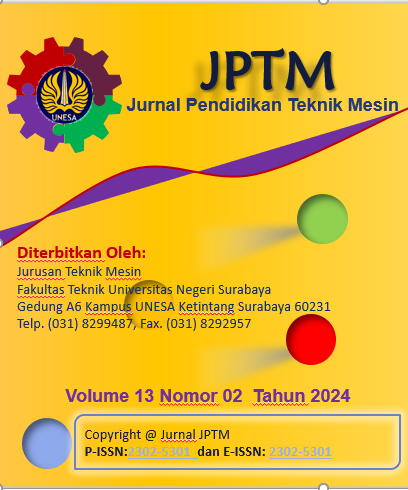PENGARUH PENERAPAN MODEL PROBLEM BASED LEARNING TERHADAP KEMAMPUAN CRITICAL THINKING SISWA SMK
DOI:
https://doi.org/10.26740/jptm.v13n02.p7-14Keywords:
Pendidikan, Model Problem Based Learning, Critical ThinkingAbstract
Future development can be supported by education, namely education that can overcome and solve problems related to education itself. Thus, the problem-based learning model is included in the independent learning curriculum implementation strategy. The problem-based learning model focuses on problems that are relevant to students. The teacher's job is to involve presenting the problem, asking questions, and encouraging exploration and discussion. The purpose of this research is to analyze the effect of using problem-based learning model on critical thinking skills of vocational students. The method used is quantitative research with a pre-experiment design, specifically a one group pretest-posttest design. The sample is class XI TPM 2 with 33 students. Data collection is in the form of a subjective question test (Essay) of 5 questions, which is given at pretest and posttest. Data analysis was carried out parametric test, N-Gain score using spss statistic 26 software. The findings indicate that the paired sample t-test test produces a value (2-tailed) of 0.000 which is lower than the significance level of 0.05 (5%). It can be stated that the use of problem-based learning model has a significant impact on critical thinking skills of vocational students. In addition, the results of the n - gain score test obtained 57.9%, including the moderately effective category. This is because the problem-based learning model can increase student participation and accustom students to analyze information, evaluate alternative solutions, and make evidence-based decisions.
Keywords: Education, Problem Based Learning Model, Critical Thinking
Downloads
Published
Issue
Section
 Abstract views: 53
Abstract views: 53





